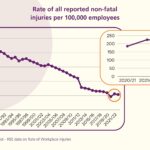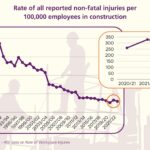Over the last five years, the proportion of students under 25 studying general health and safety courses has increased year-on-year. Young people now account for 6% of RRC’s students, up from 1% in 2019.
Likewise, the next age-bracket, 26-35 year-olds, now account for nearly a third of those taking a course with RRC (29%), up from a fifth (21%) in 2019.
Richard Stockley, Managing Director of RRC, says, “Policy and education have drastically improved the safety of the UK workplace. In the 50 years since the Health and Safety at Work etc Act of 1974, the total number of non-fatal injuries has dropped significantly more or less year-on-year, even in sectors like construction.
“With a trend this consistent, you could confidently make the claim that every new generation to enter the workforce since 1974 has been the safest ever, up to that time. This correlates with our data, with millennials and Gen Z taking more safety qualifications than previous generations at the same age.
“But this era of increasing workplace safety may be coming to an end. While interest in health and safety qualifications may continue to grow among young people, the workplace of the future will be less safe for Gen Alpha workers when they come of age than for previous generations if we can’t address the skills gap.”
UK industry has been suffering from a growing skills shortage for decades. The construction industry, for example, is estimated to have a shortfall of 225,000 workers by 2027.
Richard Stockley continues, “A lack of skilled workers in industries that deal with hazardous materials, heavy loads and machinery, automatically presents a health and safety risk. If a job calls for the use of a forklift, but there is a lack of experience among staff, the risk of accident and injury increases. Likewise, compliance is much harder, because the skills shortage also affects supervisory roles.”
HSE data indicates that the impact of the skills shortage may already be affecting workplace safety, with the rate of non-fatal injuries per 100,000 workers in the UK having risen between 2020/21 and 2021/22 from 185 to 225 for the first time since 2003:
The same was true for non-fatal injuries in construction, rising between the same years from 260 to 329:
While this is not a particularly dramatic rise, the fact that it is the first in nearly two decades is notable.
Worryingly, a recent survey commissioned by Deconstruction found that 77% of 18-24 year-olds stated that they would not consider a career within the construction industry, with no less than a quarter perceiving it as unsafe.
Richard Stockley concludes, “Young people appear to care more and more about health and safety, but the skills shortage threatens the safety of work, especially in higher-risk industries like construction. The danger here is a potentially compounding effect, where health and safety-conscious young people become less and less likely to pursue careers in construction, exacerbating the skills shortage even further.
“The solution is not obvious, the skills gap is an ongoing problem that is incredibly difficult to address. That said, perhaps policy and enthusiasm can help keep construction and sectors like it safe. Gen Alpha could have the safest working environment ever thanks to an ever more stringent health and safety culture in the UK, made possible by the increasing proportion of young people embarking on health and safety careers.”
*Survey from RRC









